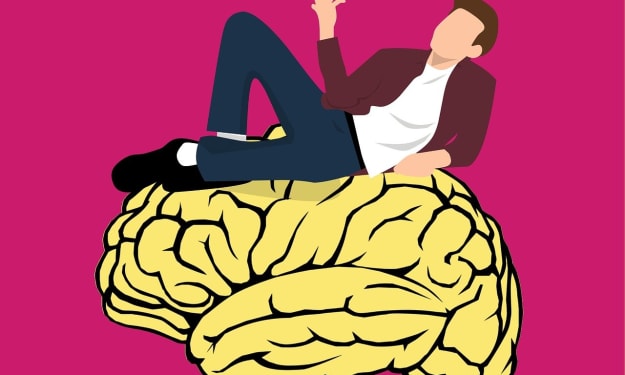I'm bored
why boredom isn't necessarily a bad thing.

In a recent study participants were placed in a room for between 6 and 15 minutes.
They were given nothing except a button that they knew would shock them if they pressed it.
They were asked to entertain themselves with their thoughts,
but they could self administer the shock if they so chose.
So what happened?
Well, 25% of women and 67% of men shocked themselves.
This is despite the fact that they had previously told the experimenters
that they would pay money to avoid the shock.
Apparently they'd rather experience physical pain than just be bored;
to have nothing to keep them occupied but their thoughts.
But they are not alone.
Around 95% of American adults report participating in some leisure activities over the past 24 hours.
But only 17% say they spent any time at all just relaxing and thinking,
because that apparently is boring, and being bored is unpleasant.
So what is boredom? Well contrary to popular belief, it's not when you have absolutely nothing to do.
It's just when none of the options you have available to you appeal to you.
Boredom is characterized by a lack of concentration, restlessness, but also feeling lethargic.
It's really a state of being underwhelmed.
And there are now more ways than ever to avoid boredom.
With Facebook, Twitter, Instagram, Snapchat, YouTube,
not to mention my chronic news I have waiting in line, sitting in a coffee shop, stopped at a traffic light.
Many people reach for their phones to stave off boredom, and nowhere is sacred.
Do you ever just let yourself be bored?
No, no, I generally don't.
But are we losing anything by avoiding boredom?
Well, scientific research says yes, and what we're losing is important.
When you're bored your mind wanders.
That's only natural.
The state of boredom is one where your attention is not focused on anything in particular.
Researchers have shown this mind wandering is useful for creativity.
They gave study participants a random boring task. The most boring one: reading the phone book.
Then, they asked participants to be creative;
generate as many ideas as they could for what you could do with a plastic cup.
Those in the most boring read the phone book condition
generated the most creative solutions compared to less bored controls.
A major reason many researchers suspect that we experience boredom
is because it gives you an indicator of your current state.
I mean, if you find yourself feeling bored, you know something about that situation isn't working for you.
Let me ask you this. When you're in class and you're a bit bored
do you ever just pull out your phone and have a look at stuff?
Yeah. All the time.
So the paradox of boredom is that it makes you feel tired, sluggish and just disinterested.
But it may actually spur you to action. It may get you to make changes that would be positive for your life.
In the absence of boredom, one would remain trapped in unfulfilling situations
and miss out on many emotionally, cognitively and socially rewarding experiences.
Boredom is both a warning that we're not doing what we want to be doing,
and a push that motivates us to switch goals and projects.
Studies have also shown that boredom may make you more altruistic.
Perhaps the acute sense of aimlessness you experience when you're bored gets out of control,
and makes you question what you're doing with your life as a whole.
But the silver lining is that it may trigger you to think about others and what you can do to help them.
And that provides an immediate and concrete purpose to a life that might momentarily feel like it's lacking one.
You know, studies designed to induce boredom have shown
that more bored participants are more likely to donate to charity, or to give blood.
So apparently the opportunity to do meaningful,
even if unpleasant activities have more value if you're bored than if you're not.
Similarly, this aimless state seems to cultivate thoughts about what you want to do with your life.
To think of your life as a story and consider where you want it to go in the future.
This is called autobiographical planning.
When given tasks that only use a fraction of mental capacity,
study participants frequently thought of the future and their plans for it.
In this way being bored is essential for goal-setting.
If your brain is always consumed with other stimuli,
you'll rarely ponder the bigger picture and set long-term goals for yourself and consider how to achieve them.
Does a phone get rid of your boredom?
Yeah, actually, thinking about it, it does.
So every time you're waiting for something,
you have a decision to make which seems like a tiny one.
Pull out your phone for a few seconds or minutes, or just be bored; experience only your thoughts.
It seems like an insignificant decision.
And if you don't give it much thought the obvious action is to see what's new on your app of choice
And in making that decision you are alleviating a moment of boredom.
But you are also likely making yourself less creative, less altruistic,
less likely to assess your current state and less likely to set goals for your future.
In short, you are the real world example of someone shocking themselves
to avoid the unpleasantness of boredom.
Except in your case, the pain goes much deeper to the very nature of who you are, and who you will become.
Of course, it's important to note that chronic or excessive boredom can lead to dissatisfaction and negative emotions. It's essential to find a balance between embracing boredom's benefits and ensuring that you're engaged and fulfilled in your daily life.
So think carefully before pressing that button.
About the Creator
Jerald Wilson
"Warning: Reading this blog may cause uncontrollable bursts of laughter, sudden moments of enlightenment, and an overwhelming desire to share it with all your friends. Proceed at your own risk!"






Comments
There are no comments for this story
Be the first to respond and start the conversation.